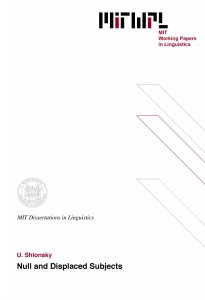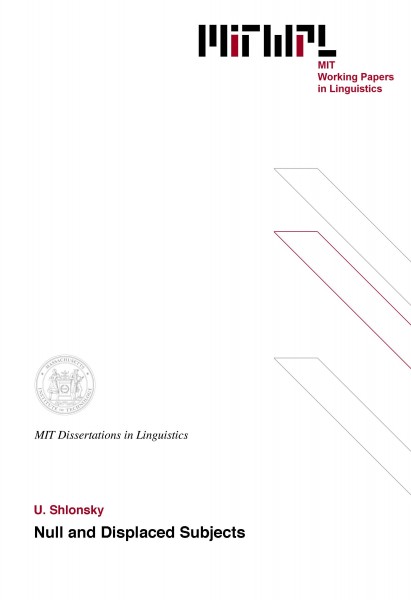Null and Displaced Subjects
U. Shlonsky, 1987
This work explores three problems related to the syntactic position of clausal subject: Do all clauses require subjects? What conditions must be met for subjects to appear postverbally? Where are postverbal subjects attached?
The discussion begins with a study of expletives, in particular, of the relationship between expletives and postverbal subjects. It is hypothesized that expletives are fillers for the syntactic subject position at S-structure and that they are replaced, in Logical Form, by the "semantic" subject of the clause. Various consequences of this hypothesis are probed, in particular, for Case theory and Binding theory.
Chapter Three develops a theory of Case which incorporates BOTH the Case Filter and the condition that heads of chains must be Case marked. The particular statement of this module of Universal Grammar has consequences for the status of null expletives and variables. There follows a discussion of the Case status of variables, in particular, in positions which are clitic doubled.
Chapter Four studies subject inversion. First, the "licensing" conditions for postverbal subjects are discussed and the relevant facts from Hebrew are presented. It is then argued that Hebrew has a rule of subject postposing which adjoins a subject to VP, on the left. It is argued that Spanish utilizes the option of left, as opposed to right, adjunction to VP, while Italian does not. Various crosslinguistic differences can be accounted for on the basis of this distinction, especially with regards to the distribution of the "definiteness effect".
Chapter Five considers the pro module of UG. It is shown that null expletives which are replaced, in LF, by arguments which are "personal", need to be supported at S-structure by coindexing with overt grammatical features.
A study of the possessive/existential alternation in Hebrew is the topic of the final chapter. It is proposed that the verb "be/have" is ambiguous between an unaccusative predicate taking a single argument to which nominative Case is assigned and a verb subcategorized for two internal arguments, one of which is marked with accusative Case, the other with inherent dative Case. The questions relating to this verb are considered with the intention of clarifying further the notion of syntactic subject.
Table of Contents
Chapter One Introduction 1
Chapter Two Expletives 4
2.1 Introduction 4
2.2 Against case transmission 5
2.3 The subject position 12
2.4 Expletive replacement 14
2.5 What is an expletive replaced by? Romance free inversion 15
2.6 There-replacement 16
2.7 Hebrew impersonal passives and expletive replacement 25
2.8 Expletive argument pairs and binding theory 27
2.9 Agreement and other problems 30
2.10 It-replacement 32
Appendix: Pleonastic elements in Hebrew 35
Notes 36
Chapter Three Case Theory 43
3.1 Introduction 43
3.2 Expletives and case 44
3.3 Variables and case 51
3.4 Variables, case and clitic doubling 55
Notes 70
Chapter Four Subject Inversion 74
4.1 Chapter abstract 74
4.2 Subjects internal to VP and subjects adjoined to VP 75
4.3 A description of subject inversion in Hebrew 81
4.4 The two inversion strategies in Hebrew 90
4.5 Triggered inversion: verb preposing or subject postposing? 94
4.6 The derived word order of inversion 102
4.7 On certain differences and similarities among Italian, Spanish and
Hebrew 109
4.8 A final speculation: VSO languages 114
Notes 116
Chapter Five The PRO Module 120
5.1 Chapter abstract 120
5.2 Null subjects of inversion 120
5.3 Properties of "Long" wh-movement in Hebrew 122
5.4 Extraction of postverbal subjects: Hebrew 125
5.5 The extractibility of postverbal subjects and the theory of pro 127
5.6 Extraction of the postverbal subjects: French 129
5.7 Pro-drop, the expletive replacement hypothesis and the Binding
Condition C 132
5.8 An argument in favor of a structural subject position 133
5.9 Expletive pro in raising and extraposition 134
5.10 Argument pro-drop in Hebrew and the feature [+/- person] 135
Notes 140
Chapter Six The be/have alternation: possessives, existentials and locatives in
Hebrew 141
6.1 Chapter outline 141
6.2 The status of yes 141
6.3 The categorial status of the dative possessor: le-phrase as a PP 143
6.4 The grammatical function of the dative possessor 145
6.5 The status of the possessed NP 149
6.6 Accusative objects in locative constructions 152
6.7 Impersonal agreement with a dative subject 157
6.8 Pro-drop in possessive yes constructions 158
6.9 Existential yes 159
6.10 The inflectional suffixes: subject clitics or AGR? 160
6.11 Hebrew as a North Italian Dialect 161
6.12 The be/have alternation: an interim summary 162
6.13 Stylistic inversion in a yes clause 163
6.14 Other unaccusatives which assign accusative case 164
6.15 The h.y.y. forms 166
Notes 171

